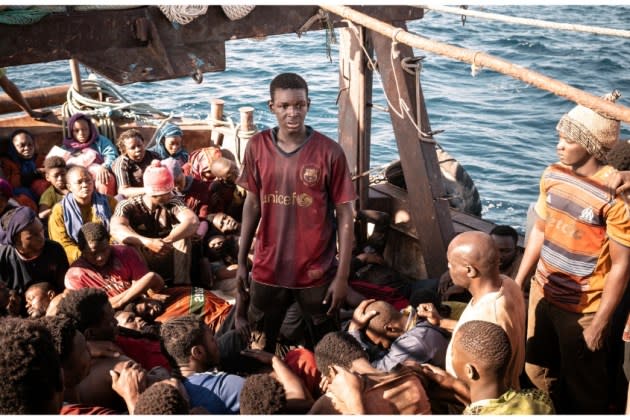Storm Clouds Over the Lido? As Italy Turns to the Right, the Future of Venice Artistic Director Alberto Barbera Hangs in the Balance
- Oops!Something went wrong.Please try again later.
- Oops!Something went wrong.Please try again later.

For Italian conductor Beatrice Venezi, 2024 kicked off on a decidedly sour note.
On New Year’s Eve the baton-wielding Venezi, a friend of right-wing Prime Minister Giorgia Meloni, was heckled at the Opéra de Nice by French anti-fascist protesters as she took to the podium.
More from Variety
Venice Opener 'Comandante' Scores U.S. Distribution (EXCLUSIVE)
'The Summer With Carmen,' Venice-Premiering Queer Comedy, Sells to the U.S., U.K. (EXCLUSIVE)
The incident reflected tensions rippling through European entertainment industry circles as far-right parties sweep to power in Italy and the Netherlands and gain ground across the EU.
Italy took a sharp turn to the right in 2022, when Meloni, whose Brothers of Italy party has neo-fascist roots, emerged the winner in the national elections. Since then her right-wing camp, which denies accusations of nostalgia for fascism, has moved to hold more sway within state-controlled media and cultural institutions such as broadcaster RAI, the Centro Sperimentale film school and the Biennale, the Venice Film Festival’s parent organization.
Scrutiny is being directed at Venezi, an adviser to Meloni-appointed culture minister Gennaro Sangiuliano. She’s also artistic director of the foundation that runs Sicily’s Taormina Film Festival. Venezi is the daughter of Gabriele Venezi, a leader of neo-fascist party Forza Nuova, but denies being a fascist. Still, within Italy’s film community there are concerns about the undue influence of Sangiuliano and others in Meloni’s government on the film and TV industry.
Last July, left-leaning producer Marta Donzelli was ousted as chief of Centro Sperimentale without explanation, prompting protests from prominent directors Paolo Sorrentino and Luca Guadagnino.
On Jan. 16, news broke that the culture ministry is plotting a similar shake-up at the state-funded David di Donatello Academy, which bestows Italy’s top film prizes.
And Venice Film Festival artistic director Alberto Barbera’s leadership is hanging in the balance. Last October, the government appointed right-wing journalist Pietrangelo Buttafuoco as the next Biennale president. Barbera, who has one year left on his contract, has turned Venice into a springboard for awards hopefuls such as “Poor Things.”
Francesco Rutelli, president of ANICA, Italy’s motion picture association, praises Buttafuoco for being “a nonconformist.” Yet he says it’s likely Buttafuoco will replace Barbera once his current contract expires.
The country’s generous production tax incentives, which lured Hollywood shoots such as “The White Lotus,” also are up in the air. Culture minister Sangiuliano wants to make them more cost-effective. But he has been dithering, leaving U.S. productions wanting to shoot in Italy waiting to see how the incentives will change.
Elsewhere, political interference is encroaching on Italy’s media industry. At RAI, which has always been a political fiefdom, Giampaolo Rossi — known for his support of Vladimir Putin and Donald Trump — was appointed director general last May. The following month, left-leaning talk-show host Fabio Fazio took his program “Che Tempo Che Fa” to Discovery Italia. Lucia Annunziata, known for grilling politicians of all stripes, also left the pubcaster in protest.
Italy’s conservative media meddling is echoed in France. Vincent Bolloré, the conservative billionaire behind Canal+ Group parent company Vivendi, is giving exposure to far-right candidates through CNews, the French equivalent of Fox News. And the governments of Hungary and Poland have been trying to quash contrarian voices. Polish director Agnieszka Holland’s refugee drama “Green Border” has been attacked by right-wing politicians and the press. In Hungary the bulk of public financing goes to movies that push a nationalist agenda.
So far that hasn’t been the case in Italy. Meloni has praised “There’s Still Tomorrow,” the megahit dramedy directed by leftist comedian Paola Cortellesi. And the culture ministry is supporting Matteo Garrone’s immigration epic “Io Capitano” (pictured), which premiered at Venice and was just nominated for the international Oscar.
Now, all eyes are pointed at what looms on the Lido after Barbera’s 2024 edition. “None of us feel the need for Barbera to be replaced,” says Riccardo Tozzi, head of Rome’s ITV-owned Cattleya.
More to the point, “in Italy there are no conservative cinephile figures — they are all leftists,” says Locarno Film Festival chief Giona A. Nazzaro.
That’s the crux of the brewing conflict between politics and art in the country. And Venice is the cultural arena where the Meloni government will show the world its true colors.
Elsa Keslassy contributed to this report.
Best of Variety
Oscars: International Feature – Is 'The Zone of Interest' a Lock to Win?
'Game of Thrones' Filming Locations in Northern Ireland to Open as Tourist Attractions
Sign up for Variety’s Newsletter. For the latest news, follow us on Facebook, Twitter, and Instagram.
